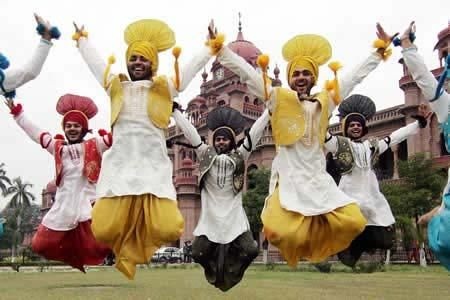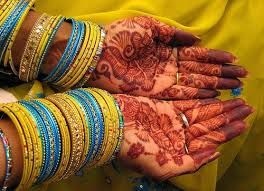


 Punjabi culture
Punjabi culture
Punjabi culture encompasses cuisine, science, technology, military warfare, architecture, traditions, values and history of the Punjabi people.[citation needed]
Contents
Middle Ages
Modern Era
Due to the large number of Punjabi People distributed throughout the world, especially Pakistan and India, many people are increasingly experiencing the culture and becoming influenced by it. Traditional Punjabi culture is being strengthened and expanded in the Western world (e.g. U.S., UK, EU, Canada, Australia etc.), the scope is huge, ranging from Punjabi Philosophy, poetry, spirituality, education, artistry, music, cuisine, architecture etc.[citation needed]
People of different languages, cultures, customs and races came to Punjab for various reasons. These immigrants were influenced by Punjabi culture.[citation needed]
Punjabi music
Bhangra is one of the many Punjabi musical art forms that is increasingly being listened to in the west and is becoming a mainstream favourite.[citation needed] Punjabi music is being used by western musicians, in many ways, such as mixing it with other compositions to produce award-winning music.[citation needed] In addition, Punjabi Classical music is increasingly becoming popular in the west.[citation needed]
Punjabi dances
Owing to the long history of the Punjabi culture and of the Punjabi people there is a large number of dances, normally performed at times of celebration, including harvests, festivals, and weddings. The particular background of the dances can be non-religious and religious. The overall style can range from the high energy "Bhangra" men's dance to the more reserved "Jhumar," the "Gidha" women's dance.
Punjabi Wedding
Punjabi wedding traditions and ceremonies are traditionally conducted in Punjabi and are a strong reflection of Punjabi culture. While the actual religious marriage ceremony among Muslims, Hindus, Sikhs, and Jains may be conducted in Arabic, Punjabi, Sanskrit, by the Qazi, Pundit, Granthi or Priest, there are commonalities in ritual, song, dance, food, dress. The Punjabi wedding has many rituals and ceremonies that have evolved since traditional times.
Punjabi cuisine
Punjabi cuisine has an immense range of dishes and has become world-leader in the field; so much so that many entrepreneurs that have invested in the sector have built large personal fortunes due to popularity of Punjabi Cuisine throughout the world.[citation needed] "Sarso ka saag" and "Makki di roti" are examples of well-known dishes. Chole- bature also is among the famous dishes from Punjab cuisine.
More popular dishes include, naan, butter chicken, mutter paneer, tandoori chicken, samosas, pakoras. Yogurt is used as a side to almost every dish. Even though there are varieties of sweets, rasgulla, barfi and gulab jamun are considered very popular.
Punjabi literature
Punjabi Poetry is renowned for its deep meaning, beautiful, exciting and hopeful use of words.[citation needed] The poetry is one of the clearest views into the Punjabi mindset. Many works are being translated throughout the world into many languages. Famous Punjabi poets.One of the Most important Punjabi literature is Guru Granth Sahib.
Punjabi dress
The traditional dress for Punjabi men is the Punjabi Kurta and Tehmat which is being replaced by the kurta and pajama, especially the popular Muktsari style in India. The traditional dress for women is the Punjabi Salwar Suit which replaced the traditional Punjabi Ghagra. The Patiala salwar is also very popular.
Punjabi Festivals
Punjabis celebrate cultural, seasonal and religious festivals, which include Maghi, Mela Chiraghan, Lohri, Holi, Vaisakhi, Teeyan, Diwali, Dussehra, and Guru Nanak Jayanti .
See also
References
- Wrestling in Punjab( Documentary Film), on History of Wrestling in Punjab by Filmmaker Simran Kaler.
- [Quraishee 73] Punjabi Adab De Kahani, Abdul Hafeez Quaraihee, Azeez Book Depot, Lahore, 1973.
- [Chopra 77] The Punjab as a sovereign state, Gulshan Lal Chopra, Al-Biruni, Lahore, 1977.
- Patwant Singh. 1999. The Sikhs. New York: Doubleday. ISBN 0-385-50206-0.
- Nanak, Punjabi Documentary Film by Navalpreet Rangi
- The evolution of Heroic Tradition in Ancient Panjab, 1971, Buddha Parkash.
- Social and Political Movements in ancient Panjab, Delhi, 1962, Buddha Parkash.
- History of Porus, Patiala, Buddha Parkash.
- History of the Panjab, Patiala, 1976, Fauja Singh, L. M. Joshi (Ed).
- The Legacy of The Punjab by R. M. Chopra, 1997, Punjabee Bradree, Calcutta.
External links
- Punjabi News website
- Video about Punjab and Punjabi music from the Horniman Museum
- Punjabi American Heritage Society
- Punjab Heritage
- Punjabi Newspaper
- Punjabi Heritage Organization of Chicago
- Punjabi Cultural Society of Chicago
|
|||||||||||||||||||||||||







